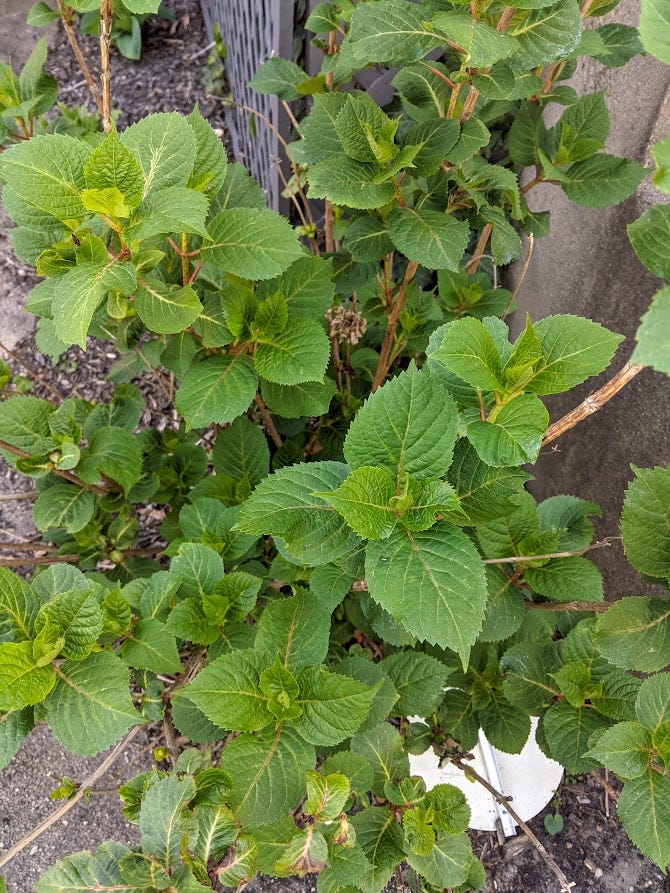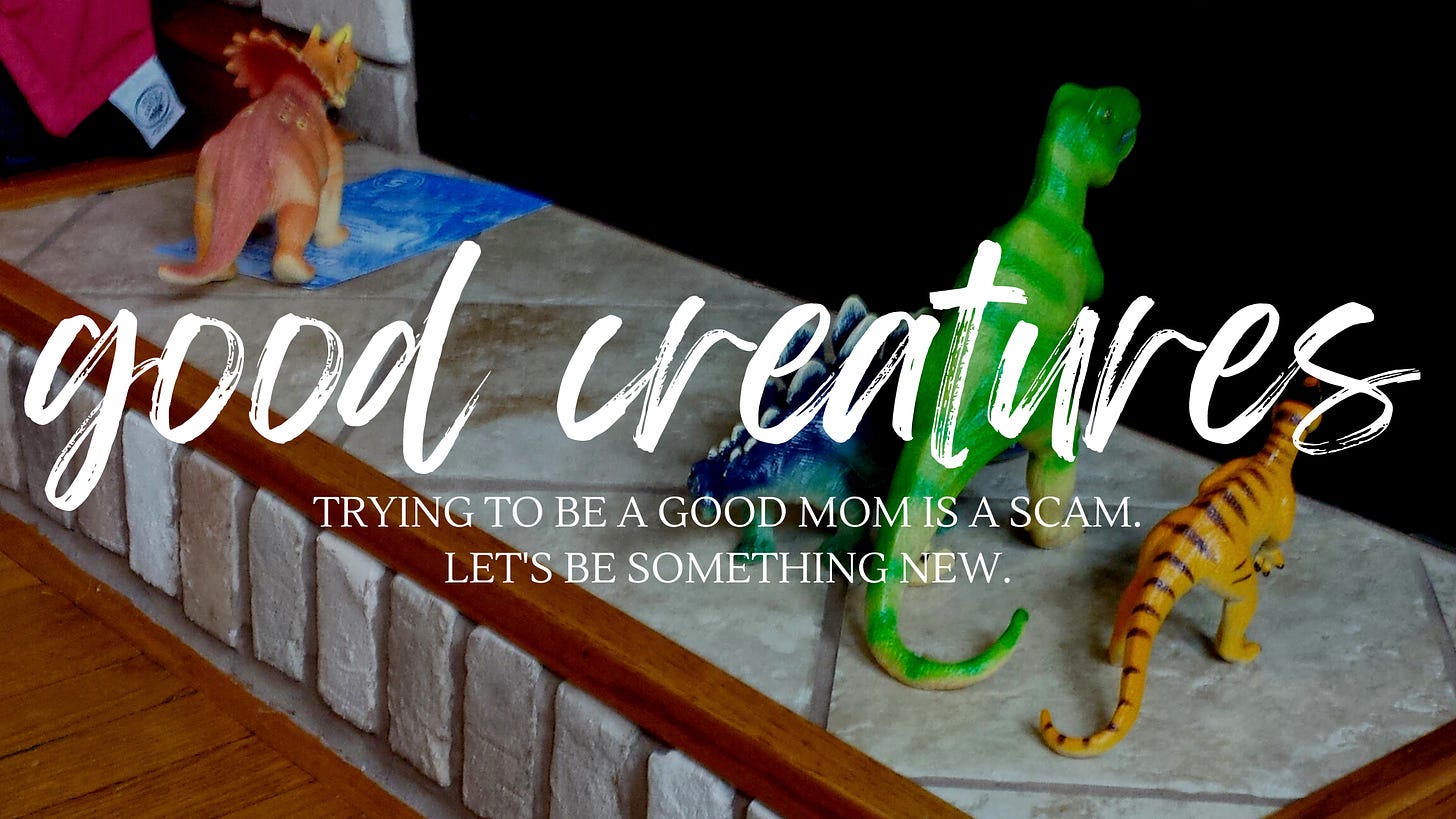

Discover more from Write More, Be Less Careful
May intentions: take it with you
resources for revision, plus a note on the new monthly format & the first look at a new project
Hello, all. It’s May.
If you were writing with us through April, you likely have a ton of new drafts, notes, and ideas. That’s so exciting! It can also be a little overwhelming—like, I’ve got all these ***words*** but what now?
This month’s newsletter provides a ton of revision exercises to help you move forward with that writing and keep up the momentum you established in April. (And if you’re just joining us, or want to go back, remember that you can always click through the archives to see all the exercises from this year’s daily exercises for National Poetry Month and last year’s, as well as all the tips, suggestions, and interviews in between.)
Moving forward, I’ll be going to a monthly format, with an occasional mid-month pop-in to share things I’ve been reading and loved or share a writing opportunity or interview. The newsletter will go out the last Sunday before each new month, with the idea being that it’s a good time to reflect on your work that month and set an intention for the new month. (So the next newsletter will be Sunday, May 29th.)
The April 30 newsletter provided some suggestions about how to work with the text you’d produce during our daily exercises, including the idea of highlighting all the ideas/words/phrases/lines you liked and writing each one on an index card to make a deck of assignments:
Get some index cards and make an inspiration deck, with one image or line or phrase or idea on each index card. I described the deck in the first post from last year’s series. Your goal is to create a pack of mini assignments or starting points you can use for writing going forward.
a little note: today’s newsletter is way longer than usual. if it gets cut off in your email, you can click on the name and read the whole thing in a browser window.
And if you read all the way to the end, you can be among the very first to hear about a new project I’m really excited to share!
setting intentions for the month
Before we get into strategies and exercises, take a moment and think about your goals and intentions for the month. You might have a bunch of drafts you’re excited to shape and revise. Or maybe you’re just getting back into a regular practice. If your schedule shifts from spring to summer, this is a good chance to think about your time.
I find it helpful to set some big-picture targets each month. Sometimes it’s word count, sometimes it’s time, and sometimes it’s product-oriented, like a number of submissions, or a promise to send a new draft to a writing partner.
I’ve written before about how counting has been helpful in my writing life, so if this is a new practice for you, you might want to click through and read that newsletter. The key takeaway is this:
Count the things you want more of
This is the big idea: counting should be a kindness to yourself, a way of noting your hard work and seeing how it adds up to something big. So whatever your goals are, writing or otherwise, think of what you could quantify and set up a system for counting it.
There are different ways of quantifying writing progress - time, word count, or milestones like finishing a scene or drafting a new poem. You should count whatever’s going to motivate you to keep working.
Before we move into revision exercises, take a look at your calendar for the month, think about what’s happening in your writing life right now, and write down some targets or intentions for May.
a revision starter pack
First, a point of clarification: what we’re talking about here is revision, rather than editing or fixing or perfecting. The magic of revision is getting to re-see your work and imagine the possibilities that aren’t there yet, the leaps and connections you haven’t yet articulated. These exercises are all aimed at helping you expand your drafts, rather than polishing. In my passion for revision, I’ve polished many a poem into a lifeless little nub. So before you delete everything you’re afraid isn’t working, slow down and look for opportunities to stretch and expand.
You’ll see that the first three are from last year’s writing prompts; the final four were generously shared by my colleague and friend Emari DiGiorgio, who shared these exercises with her group at the Murphy Writing Get Away to Write workshop in Florida this past March. (Lucky writers!) Emari notes that she developed the revision exercises by combining Erin Elizabeth Smith's generative, timed “poetry crossfit” with variations of Felicia Rose Chavez’s exercises in The Anti-Racist Writing Workshop. I’m so happy to share that I’ll be working with Murphy Writing next year as a Faculty Fellow, and I’ll be sharing lots of in-person and online writing opportunities here. (Including some upcoming readings and workshops at the end of this newsletter!)
Monster Mash
Take two older poems (or drafts or sets of notes) and fold them down the page length-wise, then mash them up, i.e. mixing the beginning of the first line of the first poem with the ending of the first line of the other poem, and so on.
Lazarus
Find an old poem - one that never quite worked, that felt too baggy or flat, or otherwise just didn't come together. You could also try using the raw freewriting text from either of the Lynda Barry prompts - #6 or #10. (Longer may be better here.)
Copy and paste the text into the Lazarus Corporation's Text Mixing Desk to see what shakes out. The Text Mixing Desk has two settings you can control, the cut-up generator and the echo chamber, so you can produce multiple versions of the same text. Try a couple versions and cut and paste the resulting text from each into a new word or google document.
The Text Mixing Desk is going to produce a lot of nonsense - so your task is to sift through it and see what’s new. What odd phrases appear? What fluff falls out? Where do you get re-enchanted? Highlight or circle the language that jumps out at you, and begin your poem there.
Tessellations
Go back through your old notebooks or old poems and find an image or phrase you like, then use that as the starting point for a freewrite into a new poem.
If you need more to get the poem going, you could add any of the following: the names of three plants, birds, or bodies of water near you; the name of a favorite shade of lipstick or nail polish (Sylvia Plath famously wore Revlon’s Cherries in the Snow; I long thought Clinique’s Black Honey Almost Lipstick was the height of glamour); any of the images or phrases from your poetry deck.
Omission
Reread your poem-in-progress with an eye for what’s NOT there.
Make notes to yourself in the margins:
Are there places where you are holding back? Why?
Are there gaps in time that feel significant?
How might you braid in the missing material?
Perspective
Revisit a draft, focusing on the writing voice–as in, who is telling the story.
Start by answering the following:
Is your writing voice reflective of how the speaker felt in the past (then)?
If the speaker reflected back now, what has changed or would change? What can the speaker see now that they couldn’t see then?
Then, revisit the text and identify opportunities to layer the “now” voice in an effort to acknowledge a shift in perspective.
Deepening
When you look back at your writing, start by pinpointing what “works.” Where do the images/music/pacing/etc hum and buzz and make magic? Mark or highlight these in one color.
Now, identify what was extremely difficult to put into words or where the rhythm/images/metaphors/etc fall apart or shift inorganically.
This discomfort/shift may be telling and offer opportunities for deepening or expansion.
Select one section and write into this discomfort/difficulty.
Structure
Answer the following:
Where does the poem start?
Where does it end?
What comes between, turn by turn? And WHY?
Draw a map (by hand) of your poem, remembering that arrangement creates movement and meaning.
Later, review your map and ask yourself: What belongs? What doesn’t? Is there something you want to add? What would a “shortcut” draft look like? What would a “meandering drive” draft look like?
upcoming events
Emily Pérez and I are going to be on Writer Mother Monster this Thursday, May 5 at 6pm eastern. We’ll be talking about our new anthology, The Long Devotion: Poets Writing Motherhood, our own new books (Emily’s What Flies Want is out May 11, and it’s so, so good!), and all the joy and challenges of writing and mothering. You can join us live, or listen later via the podcast app of your choice. (Info from the Writer Mother Monster website: episodes are streamed live on Facebook and YouTube, then archived right here as a video, audio podcast, and transcript.)
This Saturday, May 7 from 6-7.30pm I’ll be hosting a Mother’s Day Eve book party with Emari DiGiorgio and Heather Lanier at Inkwood Books in Haddonfield, New Jersey. We’ll have snacks and drinks, and we’ll share some of the books that have encouraged and guided us through motherhood. (I’ve been saying it’s all the best parts of a book club—but without the assigned reading!) If you’re in the area, we’d love to see you!
Also on Saturday, May 7, if you happen to be in the Denver area, my friend and co-editor Emily Pérez is leading a workshop, In The World: Writing Motherhood Beyond the Domestic, at The Lighthouse from 10am-1pm. (You can read more and register at that link.)
On Sunday, May 8 at 10AM, Emily Pérez is reading with Long Devotion contributors Julie Carr, Carolina Ebeid, and Ali Stine at BookBar Denver for a Mother’s Day celebration.
On Wednesday, May 11 from 4-5pm eastern, I’ll be leading a (free!) Wednesdays on the Stoop writing session with Blue Stoop.
And on the evening of Wednesday, May 11 at 9.30pm eastern, we’re so thrilled to be joining the online reading series Words Together Worlds Apart with our Long Devotion contributors Tina Chang, Clarissa Mendiola, and January Gill O’Neil.
more writing opportunities and resources
Heather Bowlan, my oldest writing friend and partner in lots of poetry and mischief, made this incredible word bank and offered to share it with you all. She writes:
I've been "collecting" words from the poetry I read for years, writing down anything that strikes me in the moment. I started this practice partly as a way to slow down and take in the language, and partly to push my own writing vocabulary out of the comfort zone.
Over time these word lists have lived in many notebooks and I wanted to organize them in one document, so I put together a Google sheet. Right now I have about 1300 words with more to add! Once I realized the list would be large, I wondered if it might be a helpful resource for other writers, too.
How to use the list? You could grab a handful of random words and just write, you could have a look when you want to refresh your language, and hopefully you could do many other things I haven't thought of yet. I hope folks will use it and share it around, and if you do find it useful, I'd love to hear about that. I'm on IG @credencive.
Lilly Dancyger is teaching her online essay revision intensive this coming Saturday, May 7 from 1-4pm eastern. I took a version of it a year or so ago and found it so, so helpful. Lilly’s a great, smart, very focused teacher—even if you can’t make that workshop, I’d recommend signing up for her newsletter to learn about future workshops.
If you’re looking for more writing exercises via newsletter, Summer Brennan’s Essay Camp is back May 16-20.
The next #1000wordsofsummer, via Jami Attenberg’s Craft Talk newsletter, starts June 4.
two free poetry workshops, the Tour of Poetry, via Stockton University and Murphy Writing:
Saturday, May 14th Rachel Bunting (11am-1pm)
Saturday, June 11th Elinor Mattern (11am-1pm)
You can attend in-person at Otto Bruyns Public Library (241 W Mill Rd, Northfield, NJ 08225) OR online via Zoom: https://us02web.zoom.us/j/82883566397.
World Above poetry reading series
Wednesday, May 18th Rosebud Ben-Oni (7pm-9pm)
Wednesday, June 15th Joel Dias-Porter (7pm-9pm
Stockton University’s Noyes Arts Garage (2200 Fairmount Ave, Atlantic City, NJ 08401) OR online via Zoom (https://stockton.zoom.us/j/95192100891?pwd=c0had1pIVkFjMVJwZ2VHYmwwaVdSUT09).
did you make it to the end?
Phew, that was a long one. I hope these resources are helpful for you!
I’m excited to share that I’m starting a new newsletter, good creatures, about the history and culture of motherhood in America. If you liked my Slate piece about goats, ducks, and the mythology of golden hour bonding, or if you’ve liked my Electric Literature pieces on the inevitably political nature of American motherhood or the whiteness of motherhood memoirs, I think you’ll really like the new newsletter. It would mean the world to me if you would click on over and consider signing up and/or sharing it with friends.
I’d love to hear from you. You can always reply to this email, comment below, or find me on twitter (@nancy_reddy) and instagram (@nancy.o.reddy).
Subscribe to Write More, Be Less Careful
why writing is hard & how to do it anyway















